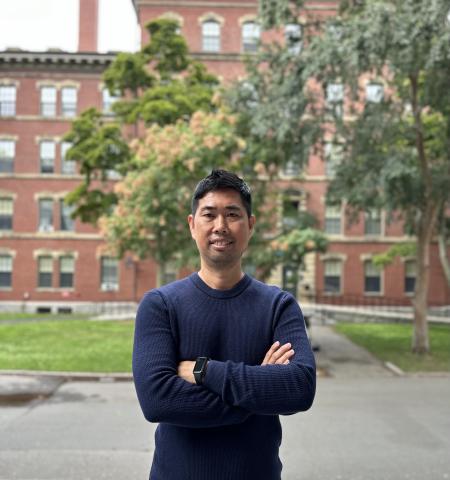Seven Questions for Southeast Asia - 9/20/24 - Rosa Yi
Southeast Asia Spotlight - 9/20/24 - Seven Questions for Southeast Asia with Rosa Yi

Rosa Yi
Harvard-Yenching Institute-National University of Singapore Joint Doctoral Scholar Program 2021-2025; Ph.D. Candidate, National University of Singapore
FOCUSING ON THE PARTS THAT PERTAIN TO SOUTHEAST ASIA, WHAT IS THE FOCUS OF YOUR ACADEMIC WORK, AND HOW DID YOU ARRIVE AT IT?
My work focuses on the political economy/ecology of agrarian commodity production and labor migration of smallholders in Cambodia. Hailing from a farming family and living for 18 years in rural Cambodia, I always feel connected to the countryside. However, my academic journey did not go straight into rural studies and research from the get-go. I first did a BA in English teaching. I worked as an English teacher in Phnom Penh for several years before pursuing my MA in International Development and Policy Studies in Japan. Upon my return, I started looking for opportunities to gain hands-on research experience, working as a field assistant/interpreter for foreign academics. I was involved in research on many different topics but with a shared geographical focus: the rural. In 2017, I was introduced to a project about Asian smallholders led by two geographers and a sociologist at the National University of Singapore. That exciting project finally brought me back to school and into a new discipline in geography and laid the theoretical foundation for my PhD dissertation research.
WHAT IS THE BIGGEST UNANSWERED QUESTION IN YOUR RESEARCH?
One of the biggest questions in my research is how the contemporary struggle for land among smallholders and the uneven spatial and social outcomes of rural development in northwestern Cambodia are shaped by the region’s long history of warfare (lasting till the late 1990s) and the political reintegration of the armed resistance forces that followed.
WHAT DISCIPLINE, OTHER THAN YOUR OWN, DO YOU THINK COULD ADD AN INTERESTING DIMENSION TO YOUR WORK AND WHY?
Though my work is geographical by design, it engages with many key concepts developed by scholars in anthropology and sociology and shares theoretical grounds with research in critical agrarian studies more broadly. Its concern with the processes of agrarian transition engendered by the capitalist development of agriculture and rural society at large involves analyzing the cultural, ecological, social, political, and economic factors and forces that facilitate or impede class formation. To nuance this analysis, it is productive to engage with multi-dimensional theoretical perspectives from geography and related fields.
HOW WILL THE NEXT GENERATION OF SCHOLARS LOOK AT AND STUDY THE REGION DIFFERENTLY THAN PRIOR GENERATIONS?
Among other possibilities, there are two things I want to mention. First, given the fast-changing geopolitical landscape in the region (marked by the rise of China) and the increasing flow of global capital into rural Southeast Asia, we must look at and study the region from more transdisciplinary approaches through which we can emphasize the role of Southeast Asia from both within and outside its geographical boundaries. For example, the financialization of Cambodia’s agriculture and rural economy has now connected Cambodian rice farmers in remote villages with financial investors based in Tokyo, Seoul, and Taipei. Second, there is a need to bring more voices from Southeast Asia into the study of the region. Indeed, Southeast Asian Studies is a byproduct of imperial wars, and till today, the region has mainly remained a research site for Western university-based scholars. It is thus essential to encourage more narratives from Southeast Asian scholars to interact and challenge the perception of Southeast Asian Studies as primarily a Western domain and promote knowledge production within the region.
WHAT WOULD YOU LIKE TO SEE AT HARVARD IN SUPPORT OF SOUTHEAST ASIA STUDIES?
It is very encouraging to see more academic events related to Southeast Asian studies organized at Harvard University. I think it is critical to sustain some events, such as graduate conferences on Southeast Asian Studies, and establish them as platforms for students and scholars in the field to gather at Harvard regularly. Also, a step forward would be providing support tailored toward Southeast Asian studies, such as academic exchange and research collaboration with scholars of/from the region. Most importantly, it would be fantastic to see the establishment of a Center/Department for Southeast Asian Studies at the university in the near future.
WHAT IS A RECENT BOOK, FILM, OR OTHER MEDIA (ACADEMIC OR OTHERWISE) FROM OR ABOUT SOUTHEAST ASIA THAT YOU RECOMMEND?
I would recommend Going Nowhere Fast: Mobile Inequality in the Age of Translocality by geographers Sabina Lawreniuk and Laurie Parsons, published in 2020. The book is an essential contribution to migration and development studies of Cambodia and wider Southeast Asia. It is accessible not only to academics but also to development practitioners and policymakers concerned with uneven geographies of development under the auspices of global capitalism.
WHAT IS THE MOST MEMORABLE SOUTHEAST ASIAN MEAL THAT YOU'VE HAD?
It was a farewell gathering that the farmers in one of the villages where I did my PhD fieldwork in 2023 organized for me. While the capitalist development of agriculture and the wider rural economy has transformed social relations in the village in many ways, the farewell brought back a strong sense of community of the old days. In the morning, the village’s elderly organized a Buddhist blessing ceremony while some young folks helped each other prepare traditional Cambodian BBQ sauces for our feast in the afternoon.



